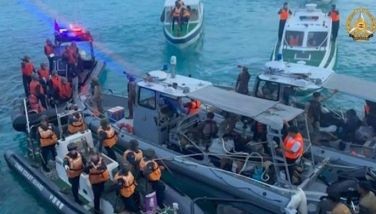A ‘hooked’ pawikan cries out for help
March 20, 2005 | 12:00am
While Efren Larauan was fishing in the deep waters off Zambales sometime last month, a "pawikan" came close to his banca with slow and pained moves. Larauan understood at once that the turtle was asking for help, for this was his second such encounter. Last November, another turtles approached him with a large, mean-looking stainless steel hook half-piercing its beak. Larauan carefully took the turtle onboard, removed the hook then set the turtle free.
Larauan knew that this new visitor was in greater danger. A thick fishing line protruded from inside the turtle coming out of its anus. He realized that the turtle needed professional care. With great concern, he took the turtle in his banca and covered it to protect it from the sun hurriedly he paddled ashore and alerted the nearest DENR office in Sitio San Miguel, San Antonio, Zambales.
Responding quickly, the CENRO-Olongapo dispatched forest ranger Vedinia Bugarin to the site. "Bugarin" was a familiar sight in Sitio San Miguel, having worked with the community in the Community-Based Mangrove Forest Management Project for over two years. After assessing the turtle’s condition as serious, Bugarin contacted the DENR’s Wildlife Rescue Center in Quezon City and soon the turtle was on its way to the veterinary specialists of the Protected Areas and Wildlife Bureau (PAWB).
When the turtle arrived at the Wildlife Rescue Center (WRC) of PAWB, biologists from the Pawikan Conservation Projct (PCP) of the PAWB identified it as a juvenile belonging to the species live ridley, (Lepidochelys olivacea). The turtle appeared depressed. After giving the turtle a dose of vitamin B-complex, the PCP’s veterinarian, Dr. Rizza Araceli Salinas brought the turtle to the Quick-Med Diagnostic Laboratory for x-ray. Results confirmed one of the rescue team’s worst fears. The X-ray showed a three-inch hook lodged deep in th turtle’s throat. Still attached to the hook was a strong three-foot nylon line that had passed through the entire length of the gut.
Together with WRC veterinarians and two on-the-job trainees, Salinas performed a medical technique that successfully removed the hook and line. After two weeks of intensive care, the turtle showed signs of complete recovery.
All five species of marine turtles found in the Philippines (green, hawksbill, olive ridley, loggerhead and leatherback) are considered endangered and are protected under the Wildlife Resources Conservation and Protection Act of 2001 (Republic Act No. 9147). The Act penalizes the hunting, killing, wounding, collecting, gathering, utilizing, possessing, transporting, exporting and/or disposing of marine turtles, turtle eggs or any of their by-products. Fine ranges from P100,000 to P1,000,000 (pesos) and/or imprisonment of 6 to 12 years.
The turtle was brought back to San Antonio on Feb. 21 for release to its home sea. A joint rescue team from PCP-PAWB and DENR Region III monitored and kept the turtle’s condition stable throughout the return trip. With the assistance of the municipal planning and development officer San Miguel and the local police detachment, Bugarin conducted a short information and education campaign for the Sitio San Miguel residents who gathered around to watch as the turtle was prepared for its release.
Forester Jimmy Aberin of DENR Region III took the scientific measurements of the turtle and attached the tags with serial numbers P21507 and P21508 to its right and left foreflippers, respectively.
The pawikan was released into the China Sea by Larauan, the very same guy who found it.
Inspired by what they have witnessed, the community members were motivated to form their own Task Force Pawikan taking off from their organization built through the DENR’s Mangrove Nursery Project.
The public is urged to report accidentally captured marine turtles to the nearest DENR office or to the Pawikan Conservation Project at the Ninoy Aquino Parks and Wildlife Center, Quezon Avenue, Diliman, Quezon City at telephone numbers 925-89-46, 924-60-31 to 35 local 223 or email address at [email protected] or [email protected].
Larauan knew that this new visitor was in greater danger. A thick fishing line protruded from inside the turtle coming out of its anus. He realized that the turtle needed professional care. With great concern, he took the turtle in his banca and covered it to protect it from the sun hurriedly he paddled ashore and alerted the nearest DENR office in Sitio San Miguel, San Antonio, Zambales.
Responding quickly, the CENRO-Olongapo dispatched forest ranger Vedinia Bugarin to the site. "Bugarin" was a familiar sight in Sitio San Miguel, having worked with the community in the Community-Based Mangrove Forest Management Project for over two years. After assessing the turtle’s condition as serious, Bugarin contacted the DENR’s Wildlife Rescue Center in Quezon City and soon the turtle was on its way to the veterinary specialists of the Protected Areas and Wildlife Bureau (PAWB).
When the turtle arrived at the Wildlife Rescue Center (WRC) of PAWB, biologists from the Pawikan Conservation Projct (PCP) of the PAWB identified it as a juvenile belonging to the species live ridley, (Lepidochelys olivacea). The turtle appeared depressed. After giving the turtle a dose of vitamin B-complex, the PCP’s veterinarian, Dr. Rizza Araceli Salinas brought the turtle to the Quick-Med Diagnostic Laboratory for x-ray. Results confirmed one of the rescue team’s worst fears. The X-ray showed a three-inch hook lodged deep in th turtle’s throat. Still attached to the hook was a strong three-foot nylon line that had passed through the entire length of the gut.
Together with WRC veterinarians and two on-the-job trainees, Salinas performed a medical technique that successfully removed the hook and line. After two weeks of intensive care, the turtle showed signs of complete recovery.
All five species of marine turtles found in the Philippines (green, hawksbill, olive ridley, loggerhead and leatherback) are considered endangered and are protected under the Wildlife Resources Conservation and Protection Act of 2001 (Republic Act No. 9147). The Act penalizes the hunting, killing, wounding, collecting, gathering, utilizing, possessing, transporting, exporting and/or disposing of marine turtles, turtle eggs or any of their by-products. Fine ranges from P100,000 to P1,000,000 (pesos) and/or imprisonment of 6 to 12 years.
The turtle was brought back to San Antonio on Feb. 21 for release to its home sea. A joint rescue team from PCP-PAWB and DENR Region III monitored and kept the turtle’s condition stable throughout the return trip. With the assistance of the municipal planning and development officer San Miguel and the local police detachment, Bugarin conducted a short information and education campaign for the Sitio San Miguel residents who gathered around to watch as the turtle was prepared for its release.
Forester Jimmy Aberin of DENR Region III took the scientific measurements of the turtle and attached the tags with serial numbers P21507 and P21508 to its right and left foreflippers, respectively.
The pawikan was released into the China Sea by Larauan, the very same guy who found it.
Inspired by what they have witnessed, the community members were motivated to form their own Task Force Pawikan taking off from their organization built through the DENR’s Mangrove Nursery Project.
The public is urged to report accidentally captured marine turtles to the nearest DENR office or to the Pawikan Conservation Project at the Ninoy Aquino Parks and Wildlife Center, Quezon Avenue, Diliman, Quezon City at telephone numbers 925-89-46, 924-60-31 to 35 local 223 or email address at [email protected] or [email protected].
BrandSpace Articles
<
>
- Latest
Latest
Latest
April 10, 2024 - 5:12pm
By Ian Laqui | April 10, 2024 - 5:12pm
March 4, 2024 - 3:32pm
By Ian Laqui | March 4, 2024 - 3:32pm
March 4, 2024 - 2:12pm
By Kristine Daguno-Bersamina | March 4, 2024 - 2:12pm
February 17, 2024 - 2:31pm
February 17, 2024 - 2:31pm
February 13, 2024 - 7:24pm
By Gaea Katreena Cabico | February 13, 2024 - 7:24pm
Recommended




























